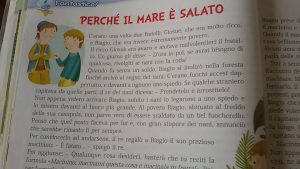NEWS Italian Schoolbook for Third-Grader Presents Anti-Semitic Stereotypes
“Once upon a time there were two brothers, Joshua, who was very rich, and Biagio, who was extremely poor. Joshua, the rich one, was miserly (written in bold) and grudgingly helped his brother. ”
The choice of the miser’s name might sound strange, but if the illustration that appears in the page shows him with a nasty grin, richly dressed and wearing a very evident kippah, it’s hard not to have bad thoughts. The story, “Why the sea is salty”, is a reduction (a deformation, to be honest) of a traditional Norwegian fairytale that contains no trace of anti-Semitism, and it is published in a school book dedicated to the third grade.
In a schoolbook published in September 2014. Not in 1938.
Four authors – Maria Chiara Laccetti, Nadia Negri, Roberta Pagano and Marianna Valerio – and their small Milanese publisher, Gaia Edizioni (recently acquired by the more established Giunti publishing group), have not been enough to realize that “Mio. My journey into the world of words” presents the worst anti-Semitic stereotypes as perfectly normal.
To eight years old kids. At school.
Hard to think of a specific anti-Semitic intent, even if it would probably be easier to deal with. Easier to stigmatize and to block, but this school book shows how a certain way of thinking is now considered so normal as to get through the numerous readings and proof readings that accompany the publishing process of every textbook. No one has felt the need to report such a dangerous detail: in both the text and in the illustration that accompanies it the bad, the miser, the egoist is instantly recognizable as a Jew.
It is ironic then to read in the publisher’s website that “Gaia Edizioni is a young publishing company that works for primary schools in order to offer effective and updated working instruments and learning paths to teachers and pupils.” Or, again, that “Books, operating workbooks, teaching guides and materials are the result of the collaborative work of teachers and experts coming from various Italian companies, all particularly attentive to the novelties and to the needs of schools that are in constant transformation”. What it does not seem to have changed, however, is that creeping antisemitism which in this case is brought directly into the place that should be devoted to fight all discrimination, in the classrooms where should thrive the adults of tomorrow.

